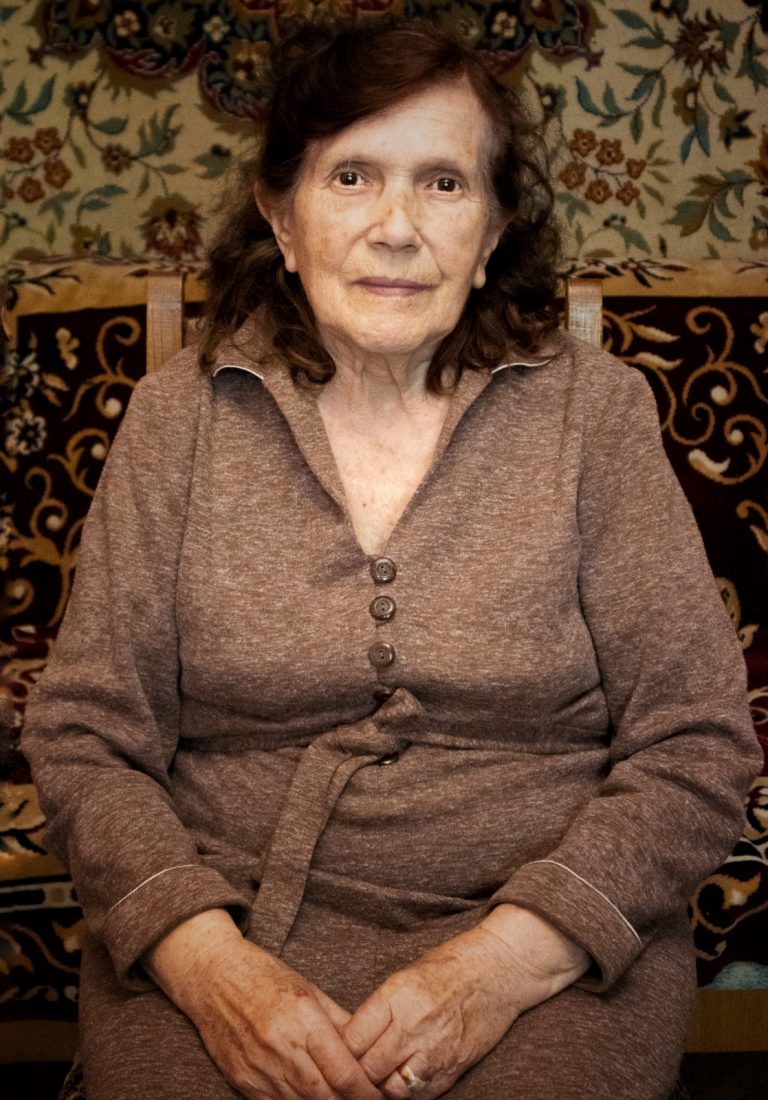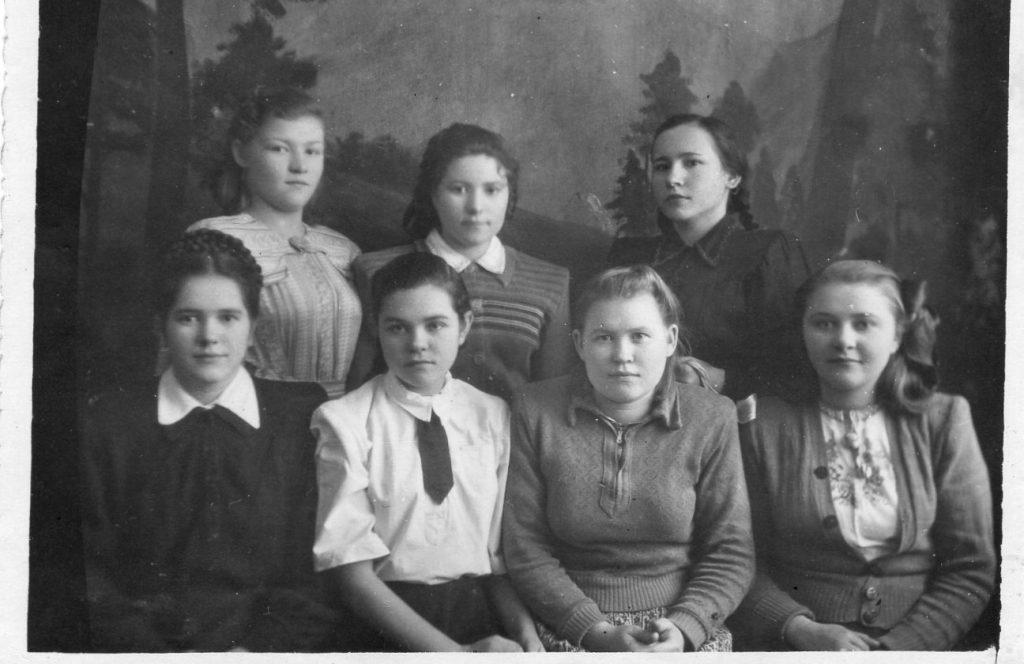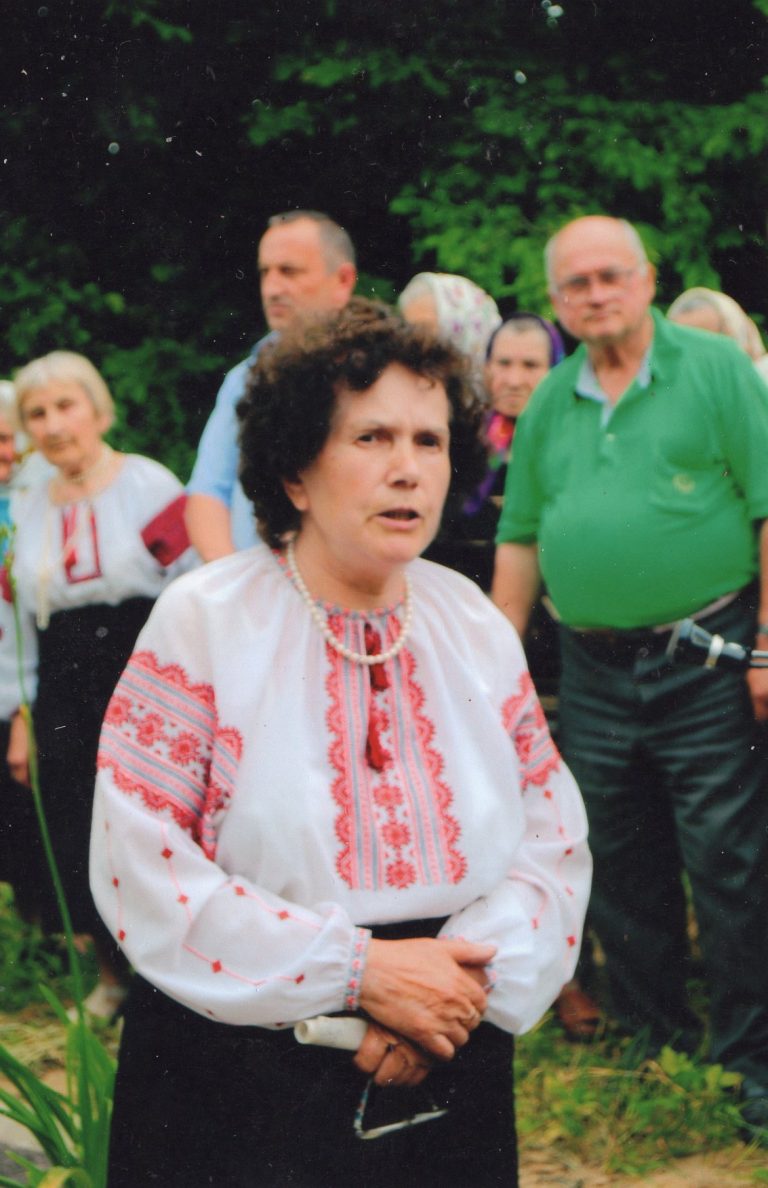Darya Hermak
“She had to be shot. Why has she been sent here?

Born in 1936 in Radokhyntsi village, Mostyska district, Lviv oblast
Soviet security agencies arrested 13-year-old Daryna right behind her school desk. A teacher found clandestine leaflets in the girl’s bag. For some time, the girl has been acting as a liaison for her older brother, an UPA [the Ukrainian Insurgent Army] fighter who was hiding in the woods. Soviet authorities sentenced him to 25 years in correctional labour camps, and Daryna was sent to the juvenile high-security prison in Invankovo region (Russian Soviet Federative Socialist Republic) to be “disciplined”. During her detention in Drohobych and Sambir prisons, she was tortured and physically abused. The girl was kept in transit prison #25 in Lviv for some time.
Daryna’s mother had a stroke after her children had been arrested, and remained bedridden for the rest of her life. In 1957 Daryna returned to Western Ukraine and started living in Lviv.
In addition to Dariya, the family had four other children: Taras, Petro, Mariya, and Anna, who died in infancy. The family maintained ties with the Ukrainian Insurgent Army. After studying at the gymnasium in Przemyśl, her brother Petro returned home, where he took an active part in the military life of the Ukrainian Insurgent Army – first he organized a hideout in the barn of the family house, and later in the woods.
“But the fact is that our house was big, we lived comfortably, and they even sent NKVD members to live in our apartment, [they] had such overalls and lay down in the snow, because it was not visible that he was lying there, he even had something to cover his head. And that was very dangerous. Well, when they were there, even my mother could not give food to them [UPA fighters]. It even happened once, when she was carrying a pigwash for the cows, and on the other hand – food. But when the KGB members were coming, she had to pour everything into the pigwash, so they don’t notice. Well, it was hard for everyone, and it was hard for them [UPA fighters]. Then they say, “We can’t (sit like that) all the time…” They can’t leave, because the KGB members are in the house. He says, “We will not sit in hiding all the time.” Then the brother left and he made them a hiding place in the woods. And we saw any hiding in the woods, I vividly remember it. But we had to bring them food there, and to pass the information.”
After moving the hideout, the brother asked Dariya to be a liaison, “And then I was a liaison from the age of ten, I was going to the forest.”
This task was often very dangerous for the child:
“It was necessary to disguise everything somehow. Well, I kept going, walking, walking. There was a time when there were Muscovites. Once they were in the woods, I didn’t know it, and they saw me. I see they are following me. I’m not afraid, I won’t run away, but I keep walking… I knew that forest better as they did. I got into bushes of sloe, you know. The bushed had thorns below, and there were thorns as big as a finger. And they follow me, there. Then they were swearing at me. I got scratches from the thorns, but I knew how to get out. I wasn’t just walking, and I knew how to take a step back, then move forward and sideways, and there was a trail. And I ran away. They even were shooting at me. Well, I did run away. They were raking around for something, I don’t know what they were doing. Well, I ran away. Well, that’s how it was. Then I’m telling you, they did not come for me, they were already there. Well, and so I still kept going there, as much as I could, but, as they say, everything has a beginning, and everything has an end. And they tracked me.”

Later, teacher Beliayeva was sent to live in the house of the Zamorylo family. She taught mathematics at the school that Daria attended. Since then, the narrator has carefully kept back where she was going. But over time, the teacher found in the girl’s bag campaign leaflets. Dariya Zamorylo was arrested on December 5, 1951, at school during the physics class:
“So, it was the last lesson of the day, the physical science lesson and they knocked on the classroom’s door. I saw some military guy knocking at the door. So the teacher looked around, and he [the military] said: “What do we have here, what is this class?” “This is the seventh grade”, “And why are you sitting here for so long?” “Why is that, are those children so slow, or what? Why are you sitting so long?” The teacher answers, “No, we have the sixth lesson on schedule.” And then he says: “There are different сases, some of them are, some not.” Then they go inside the house, enter the classroom. They go inside the house. There were three or two of them coming in, and one stood under the window. He stood somewhere there. Because I wanted to jump out the window, and I saw him standing at the exit. So, so what? And then they said, “You, you, and you”, he said to the three of us – me, my friend, and her sister. “You stay.” Well, other kids left the classroom, they were looking at us. The teacher understood everything. I remember him, Zarichnyi, he was from Eastern Ukraine, but he was a real Ukrainian, and he just shook his head, he already understood what was waiting for us.”
The year before, in 1950, the brother Petro had been arrested and sentenced to 25 years in prison. He was serving his sentence in Norilsk, where he was released in 1957.
Dariya was arrested along with two classmates – sisters Ivanka and Anelia Tyrus. After interrogations at school, Dariya and Ivanka were taken to a prison in Drohobych and later transferred to Sambir. There, Dariya was visited by her father, to whom she told a “dream about ten apples” that the teacher “gave” her. The father realized that his daughter had been sentenced to 10 years.
After Sambir, Dariya was sent to a transit prison in Lviv. From there she was transferred in wagons to a children’s labor colony in Tutaev: she was transported in “Voronok” to the train. The train was, you know, it was called a “calf-barn”.
In Tutaev, and then in Kineshma, where the girl was later transferred, it was difficult for the girl to find common ground with other prisoners:
“Because I was not given a political sentence, I was given a “re-education” in a children’s colony of a strict regime among those “bytoviki” (serving for domestic crimes) of all kinds. I was a “fascist” there, they wanted to kill me there twice. Things I went through, I wonder now how I could endure it. They even didn’t let me eat, what I ate… There were 4 people at the table, they immediately took and divided my portion. They didn’t even leave at least a piece of bread. I was hungry, drank water so I wouldn’t fall, I was feeling dizzy.”
After the typhoid epidemic, Dariya was transferred to a colony in Kineshma, where she worked in a sewing shop. They sewed clothes for prisoners there.
“And they started paying a little bit, some, some money. And when they came to the stall in that camp, then those, those minors, then they went there to buy everything to eat, and I сolleted (money), I was thinking, I would buy something for myself. Anyway, someday, maybe sooner or later, someday I will come home, I will need something, how would I go back in this striped dress, people would laugh. And I was saving money for myself, and there because of military commissar, you know, the Baltics, they bought material there with the help of mercenaries, and they sewed me one, the material, I remember it vividly – of blue color and polka dots. And they sewed me a very beautiful dress, they found a little bit of “krepliashyn”, sewed something, and they made a big beautiful collar sewed with white fabric. And then I actually came home in that dress.”
After returning, the girl moved to Lviv, where she graduated from tenth-grade evening school. She later entered Lviv State University, but due to problems with a residence permit, which she could not obtain due to a criminal record, she was able to complete only two courses. After that, she joined a technical school of light industry. All this time she rented a room in a local janitor; she got the apartment later – while working at a garment factory, where she worked until retirement.
One day she met her former teacher, who told her:
“And that teacher, the one who actually betrayed me, said: “I was stupid.” And asked:. “How did you find out?” I say: “That Rybkin told me, he told me everything.” – “What a bastard he is. What a bastard he was. He said he would not tell anyone.” I answer, “So why did you come to me? Then go tell him. Why did you come to me?” – “Forgive me, forgive me”, the teacher says. I answer: “I can’t forgive you, I can’t. What did I do, what have I done to you?” I add: “Did my parents feed you too little? Did you feel bad staying at my parents’?” – “Why are you saying that, I was so…” Well, I pushed her away, she was still following me, I said: “I’m going to a class.” At that time, I believe, I was attending the university.”
(photo: Darya Hermak during public activities, 2000s.)

